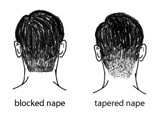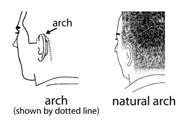Get the Perfect Haircut: How to Talk to Your Barber
Monday, September 15, 2014 - Filed in: General Interest
Think back to your last haircut. How’d you feel about it when you walked out of the shop? Disappointed? While your disappointing haircut might have been due to poor barbering, it’s often the case that your poor communication with the barber was at least partly to blame. Barbers can’t read minds. If you don’t tell them exactly what you want, you’re going to get whatever haircut the barber feels comfortable giving. For example, I knew an old barber (and I’m talking old) who’d give every customer a crew cut if the customer didn’t explicitly say exactly how he wanted his hair cut.
If you want to avoid this fate, you have to learn how to talk to your barber. But telling a barber what you want can be intimidating for a man, especially with all the special lingo they throw around. Well, never fear. I called up registered master barber Steve Hankins from Red’s Classic Barbershop in Indianapolis, IN to get the scoop on how to confidently communicate with your barber. With his tips, we’ve created a comprehensive guide on what to say to your barber so you get exactly the haircut you want next time you plop down in that chair. Let’s get to it.
Tell him what general style you want
When you first sit down in the barber’s chair, try to give him a general description of the style you want. Are you looking for a crew cut? Are hoping you to look like Don Draper? Perhaps you want a more modern style. You might want to bring in a photo of the look you’d like to achieve. Once you’ve got this covered, you can then get into the specifics.
Tell him how much you want taken off and where
After you tell your barber what general style you want, tell him exactly how much you want taken off. Don’t just say, “Give me a trim, Mac” or “Just a little off the top.” One barber’s trim is another barber’s close shave. To avoid getting your hair cut too short, Steve says to be specific with how much you want taken off. “Short and long are all relative from barber to barber,” he says. So say things like “an inch off the top” or “a quarter inch off the side.” If you don’t know exactly how much you want taken off, let your barber know you don’t know. What he’ll probably do is just cut a bit off to see if you like it. Then if you want it shorter, you can go shorter. If you’re a clippers man, memorize the numbers of the guards you use. Then you can just walk into the barber and tell him “I want a 2 on the sides and a 3 on the top.”
Tell him if you want a taper

When you’re at the barber, you’ll likely hear the word “taper” thrown around quite a bit. If you’ve been nodding your head all this time and saying “Yeah, give me that!” even though you have no idea what a taper even is, here’s a quick rundown on what a taper means when it comes to haircuts. A taper gradually changes your hair length from the top of the head down to the nape of the neck. The taper usually starts off long at the top and gets shorter as you go down to the neck. The length of the taper can vary. You can have a really long taper or a short taper. Most men’s haircuts involve some sort of taper, but some men prefer that their hair length be the same all around their head. Make sure to tell the barber your preference.
Tell him what kind of neckline (or nape) you want

A lot of men don’t think about how their neckline looks because they hardly ever see it, but the masses of people who walk and stand behind you get to eyeball it every day. If you don’t keep it clean and trim, a great haircut can suddenly look unkempt. When choosing what sort of neckline you want, you have three options: blocked, rounded, and tapered. Each has their pros and cons.
Blocked. A blocked nape means cutting a straight line across the natural neckline. When done correctly, your neckline will have the appearance of a squared block. If you’re self-conscious about your skinny chicken neck, a blocked nape can give you the appearance of a wider, thicker neck. If you already have the neck of a drill sergeant, go with another type of neckline. The biggest drawback with blocked napes is that they will appear untidy as the hair grows out. Once the hair begins to grow under the neckline, the new hair growth sticks out like a sore thumb. If you decide to go with the blocked neckline, it’s recommended you go back into the barber once a week to clean it up. Or better yet, learn to do it yourself.
Rounded. A rounded neckline simply takes the corners off a blocked nape finish. Like the blocked neckline, the rounded nape can start to look untidy once hair starts growing below the neckline.
Tapered. Instead of creating a strong line at the nape of the neck, a tapered neckline follows the natural neckline and gradually shortens the hair as it gets closer to the bottom of the neckline. A tapered neckline can slim a wide neck. However, the biggest advantage to the tapered nape is that as your hair grows out, the neckline remains blended and neat. You won’t need frequent touch-ups as you would with a blocked or rounded nape.
Tell him if you want any texture in your hair
Many of the more modern men’s hairstyles incorporate some sort of texturing. Steve the Barber recommends using these terms with your barber if you’d like to add some texture to your hair:
Choppy. When you need a bit of volume to your hair, ask for choppy. Choppy hair occurs when the barber uses point cutting. He’ll pick up the hair at different lengths and cut it at a 45 degree angle. You can then run product through your hair and style it as you please. The result is a nice, textured look.
Razored. When a barber razors your hair, he uses a straight razor to trim the ends instead of scissors. “Why,” you might ask, “would I want the barber to use a straight razor to cut my hair?” First, it’s badass. Second, it helps the hair lay flatter on your head and diminishes bulk. “If you have really curly hair, you might ask your barber to trim the edges with a razor blade,” says Steve.
Layered. When you have longer hair resting on top of shorter hair, you’ve got layers, my friend. If you have thinning or balding hair, layers can give your hair the appearance of depth and volume.
Thinned out. If you have a thick, bushy mane, ask the barber to bust out the thinning shears to take some of that volume off your brain canister. Thinning shears look like regular scissors, but they have teeth that cut some hair strands and leave other strands uncut. Men with normal hair thickness will be okay getting their hair thinned every other visit to the barbershop. If you have a giant furry animal living on your head, Steve suggests getting it thinned at every visit.
Tell him how you want your arches

The spaces between your hairline and your ears are called arches. Here’s how you can trim them.
High arch. You can ask your barber to cut the arch around your ear higher into your hairline. That will leave more space between where your hairline ends and your ears begin. Men with smaller ears might consider a higher arch as it can make the ears appear larger. The disadvantage with having a higher arch is that it can look messy and awkward as your hair grows out. And if they’re too high, they make you look pretty dorky.
Natural arch. For most men, keeping their natural arch is the way to go. That’s what Steve the Barber recommends; “It just looks better,” he says. Tell the barber to keep your natural arch and he’ll just clean it up with some short trimming.
Tell him how you like your sideburns
Finally, tell him how you like your sideburns. Basic details you should give him include how long and how thinned out you want them. Possible sideburn lengths include:
- Top of the ear
- Mid-ear
- Bottom of the ear
If you’re not going for the Ambrose Burnside look, ask your barber to trim and thin out your sideburns a bit.
Now quit yapping and listen to your barber for a minute…
After you’ve told the barber what you want, Steve suggests shutting your yap and listening to your barber’s suggestions. “A lot of guys come in with an idea of how they want their hair, but it’s just not possible with their hair type. Or what they’re asking for won’t look good with their face. Customers need to come in with an open mind and they have to be flexible,” says Steve. Listen to what your barber has to say and trust his expertise.
Your relationship with your barber is like any good relationship-communication should be a two-way street. He should listen to what you’re looking for and give you feedback and advice. A good barber will ask you if you’re happy with how your hair looks as he goes along. If your barber doesn’t communicate at all and doesn’t listen to your preferences, it’s probably time to pick a new barber.
One of the best parts of the barbershop tradition is that as you partake of this manly ritual, the barber can become your buddy, someone you’re not only comfortable with, but look forward to seeing. After awhile, all you’ll have to say when you plop down in his chair is, “Give me the usual!”
